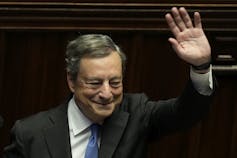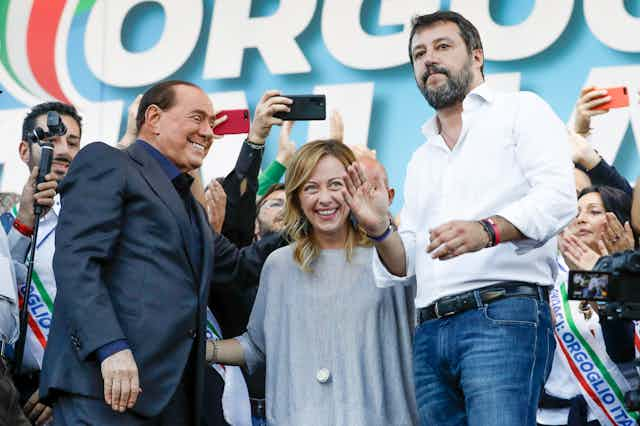Italians will soon vote in national elections and the country will have its 70th government since the founding of the republic in 1946.
Recent polling on voting intentions point to a significant victory for the right-wing coalition with Giorgia Meloni’s party, Fratelli d'Italia (Brothers of Italy), at the helm. These results could usher in the country’s first female prime minister, but questions remain about how far right she will govern, how long support will last and how she’ll respond to European and international pressures.

Italy is notorious for its political fragmentation and governmental instability, often struggling to reach a full year with the same cabinet in power.
Shrewd political manoeuvring has led to the rise and fall of many coalitions and technocratic governments over the past few decades, including the recent national unity government of Mario Draghi, the former head of the European Central Bank, which collapsed in July 2022.
Hung parliament
This election is significant because it’s the first held since 2018, when the anti-establishment Movimento Cinque Stelle (Five-star movement) and Lega (the League) won the most seats in a hung parliament and found a governing compromise with non-politically aligned leader Giuseppe Conte, who served until January 2021.
Draghi was then appointed prime minister by President Sergio Mattarella, with support of all major parties — except the Brothers of Italy — to stabilize the government during recovery efforts from the COVID-19 pandemic, including overseeing critical European Union financial support to Italy.
This campaign also appears to be Meloni’s to lose, as her support has grown from four per cent in 2018 to 25 per cent today. Along with her right-wing coalition partners Matteo Salvini (the League) and Silvio Berlusconi (Forza Italia), they are approaching 50 per cent and are forecast to win potentially large majorities in both Italy’s Chamber of Deputies and the Senate.
The centre-left coalition made up of the Democratic Party and other small parties, with less than 30 per cent support, have opted not to partner with the Five-star movement and risk being banished to opposition benches for years.

Towards a right-wing victory?
Meloni has been in politics for a while, joining the post-Mussolini era neo-fascist party, the Italian Social Movement (MSI), as a youth.
By 2008 at age 31, she became Italy’s youngest ever minister, managing the Youth and Sport portfolio in Berlusconi’s government. In 2012, she founded Fratelli d'Italia, and since then has grown the party by conjuring up the former rhetoric and populist policy positions of both the MSI and Berlusconi’s former right-wing partner, the National Alliance.
Brimming with confidence from recent polling results, Meloni is projecting a “ready to govern” attitude in the final stretch of the campaign.
Her party has surpassed the traditional right parties of Forza Italia and even the League.
The largest vote winner in the coalition generally becomes prime minister in Italy, and Meloni knows this. She has tried to assuage concerns about some of her radical proposals and anti-European Union rhetoric by claiming she’ll govern for all Italians in support of the EU and NATO alliances, but with a much different tone than previous governments.
Meloni’s Italian-style populism
Like her populist predecessors across Europe, Meloni has honed in on soaring cost of living, demographic crises, pandemic fatigue, migration and economic malaise with typical promises about returning power to the people from the elites, securing the border and reviving the economy by lowering taxes and regulations.
Promises include renegotiating Italy’s massive EU COVID-19 recovery plan, changing the constitution to elect the Italian president by popular vote, erecting a naval blockade of migrants from Libya and integrating fewer Muslims.
Read more: Italy – once overwhelmed by COVID-19 – turns to a health pass and stricter measures to contain virus
All of this is premised on returning the cultural values of the “traditional” Italian family, which means rolling back the clock on LGBTQ+ rights and even a pledge to ban Peppa Pig episodes over the use of same-sex couples in the animated kids show.
As she pursues these policies and cozies up to allies like France’s Marie Le Pen and Hungary’s Viktor Orban, observers are worried about Italy’s rightward drift.
Yet whether her main coalition partners, Salvini and Berlusconi — two powerful men with their own large followings — will support Meloni as prime minister for many years is in question. While the parties share some libertarian economic views and traditional cultural outlooks, their differences are significant.
The League under Salvini has worked for years to broaden its appeal to the rest of Italy and shed its northern, separatist moniker (it was formerly called Lega Nord) by focusing on migrants and the EU as scapegoats for Italy’s woes.
But it appears Meloni poached a good number of right-wing and disenchanted voters who temporarily sided with the Five-star and the League in 2018 with her similar but more forceful populist promises.
Berlusconi as king-maker
Enter Berlusconi. He was pushed to resign in 2011 during the sovereign debt crisis in favour of technocrat Mario Monti and was convicted on a number of charges related to prostitution and tax fraud.
He completed community service and was banned from Parliament, but this ban was lifted by a judge in 2018.

He may be poised to be the kingmaker of the coalition. Running as a more responsible, pro-EU statesman and centrist than his partners, he could have a large say in the direction of governance and policy if the election results are tight, and could threaten to remove his support at a moment’s notice.
This might mean that Meloni’s governing style and hard-right promises will be moderated by her centrist partner.
Perhaps even more important moderating influences will lie within the EU and the international community. Italy has been an important NATO and EU member.
The highly indebted government is also reliant on EU recovery funds and financial markets, so any radical fiscal moves or egregious violations of human rights on the migration front will likely be countered by international and EU pressure.
Time will tell how far right Italy will drift in the coming year and what will happen if it does, and there’s little doubt other far-right parties in France, the Netherlands and Germany will be taking notes.


